[ad_1]
AI recruiting tools have become indispensable, particularly in talent acquisition. These tools analyse and evaluate applicants using AI algorithms, providing objective insights into their suitability for roles.
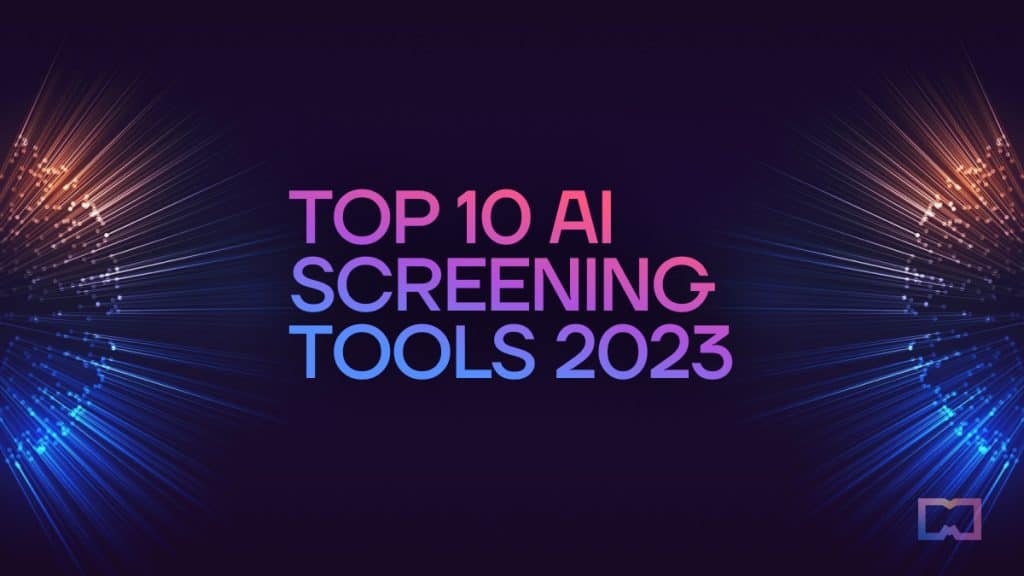
These tools are used by a diverse range of industries and organizations, spanning from corporate enterprises to educational institutions. Human resource departments within companies use these tools to efficiently sift through large volumes of job applications, identifying top candidates based on predetermined criteria. Educational institutions leverage AI screening to select the most promising students for their programs, while healthcare institutions streamline the process of selecting medical professionals.
Essentially, any entity involved in candidate selection can benefit from the accuracy and efficiency that AI screening tools bring to the table.
Different AI screening tools cater to specific needs across industries. For instance, Resume Screening AI uses natural language processing to analyze resumes, extracting key information and cross-referencing it with job requirements for precise shortlisting. Video Interview Analysis employs AI algorithms to assess verbal and non-verbal cues, offering insights into communication skills of candidates.
Personality and Behavioral Analysis delves into candidates’ traits through their digital footprint to help recruiters understand if they will fit into the company’s culture. Language Proficiency Evaluation ensures effective communication in global companies by scrutinizing candidates’ language skills. Cognitive Ability and Problem-Solving Tests identify top analytical minds, while Predictive Analytics Tools use historical data to understand the end-to-end recruitment process.
Social Media Screening analyze candidates’ social media profiles to identify any red flags, while Emotion Detection and Sentiment Analysis offer nuanced insights into candidates’ attitudes. Diversity and Inclusion Assessment tools combat bias by analyzing backgrounds.
1. Humanly
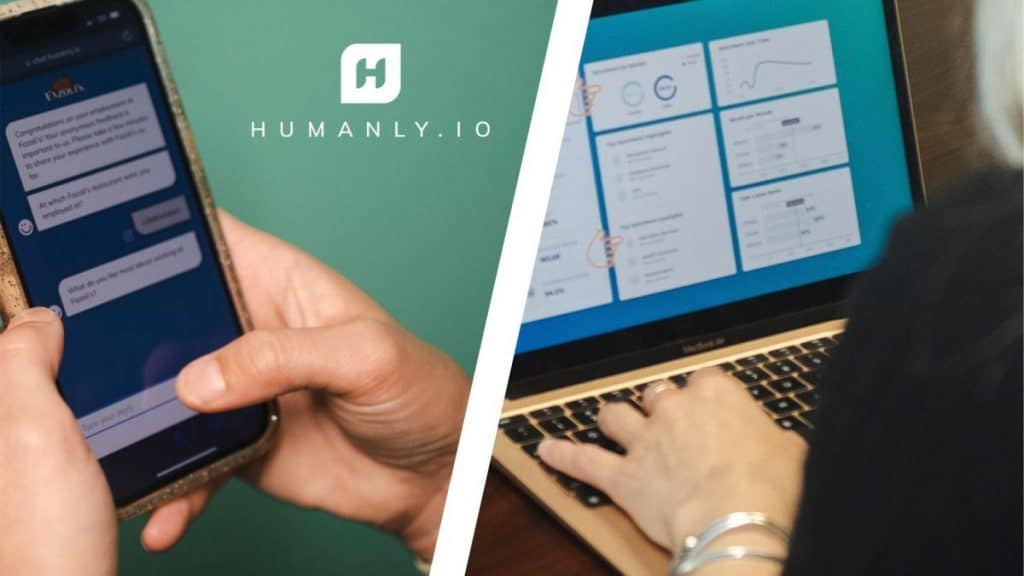
Humanly is an AI-powered recruitment tool that provides chatbot software for screening and scheduling potential candidates. The chatbot draws on Humanly’s library of role-specific conversational templates to ask candidates the right set of questions to get a holistic view of their skillset and background without adding bias.
The tool also analyzes a company’s existing engagement data and recommends pertinent culture-related questions they could be asking all to surface candidates that add to the company’s culture. Humanly uses predictive learning techniques to assess the potential long-term value of each candidate find employees that can positively impact organizations in the long run.
Pros:
- Humanly’s conversational interactions are stripped of bias triggers such as gendered words, culture-specific terminology, and more.
- The platform’s interview assistant can auto-summarize the most important parts of an interview and generate easy-to-read bullet points to help organizations speed up candidate selection processes.
Con:
- It’s a fairly new platform which means its accuracy is still undervelopment.
2. HireVue
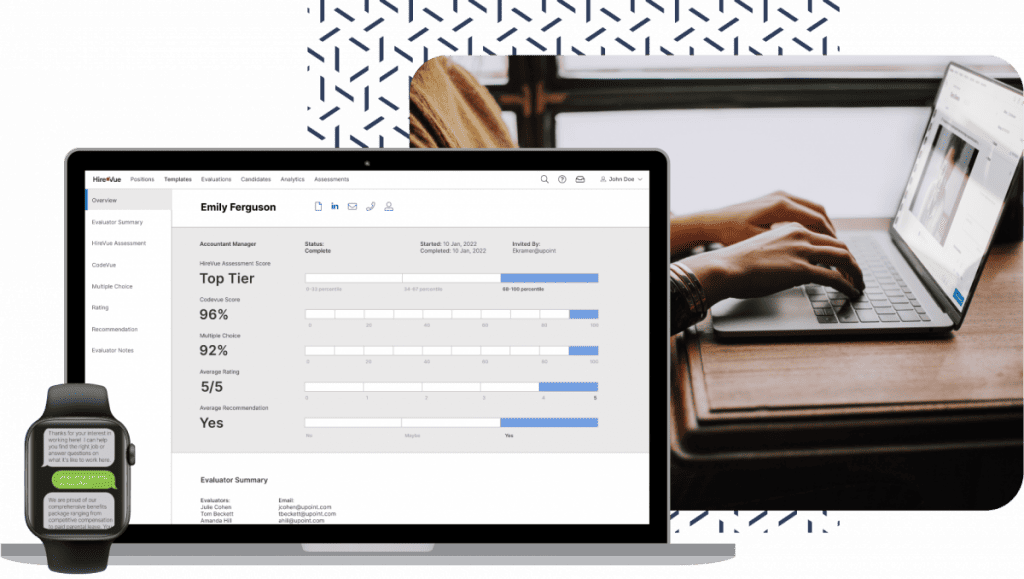
Leveraging advanced AI and machine learning, HireVue offers a comprehensive suite of tools designed to assess candidates’ skills, personality traits, and cultural fit through video interviews. This tool analyzes verbal and non-verbal cues, enabling recruiters to make more informed hiring decisions based on a holistic understanding of each candidate’s potential.
With HireVue, organizations can streamline their recruitment efforts by conducting remote video interviews, reducing time and logistical constraints. The platform’s AI capabilities not only evaluate candidates’ responses but also provide insights into their communication skills, emotional intelligence, and problem-solving abilities.
Pros:
- AI-powered video interviews enable efficient initial candidate screening.
- The platform’s analysis of verbal and non-verbal cues provides a more comprehensive understanding of candidates’ skills, personality traits, and cultural fit.
Cons:
- Candidates and interviewers may face technical issues during remote interviews.
- There are potential algorithmic biases in assessing candidates based on non-verbal cues, which may inadvertently perpetuate existing biases.
- May be expensive for large organizations.
3. DevSkiller TalentScore
DevSkiller TalentScore is an AI-powered technical screening platform for hiring software developers. With a focus on skill-based evaluation, the platform offers more than 5,000 recruitment tasks and coding challenges mirroring real-life use cases that accurately gauge candidates’ coding abilities, problem-solving skills, and technical expertise.
By using AI-driven code review and analysis, DevSkiller TalentScore provides recruiters with comprehensive insights into candidates’ capabilities to arrive at informed hiring decisions that align with a company’s technical requirements.
Pros:
- DevSkiller TalentScore offers a highly accurate assessment of candidates’ technical proficiency through real-world coding challenges.
- The platform significantly reduces the time required for technical assessment by automating code review and analysis
- DevSkiller TalentScore’s AI-driven approach ensures fair and consistent evaluation based solely on candidates’ coding performance.
Cons:
- May not provide a complete understanding of candidates’ problem-solving strategies or collaborative abilities in a team setting.
- The focus on coding skills might overlook other valuable qualities, such as soft skills or domain knowledge.
4. Pymetrics
Pymetrics is a soft skills platform that uses using data-driven behavioral insights and audited AI to create a more efficient, effective, and fair hiring process across the talent lifecycle. Grounded in neuroscience and behavioral science, Pymetrics leverages advanced algorithms to provide a unique and holistic understanding of candidates’ cognitive and emotional traits.
By combining cognitive games and assessments, the platform offers a comprehensive evaluation of candidates’ cognitive abilities, personality traits, and potential fit for specific roles.
Pros:
- Pymetrics’ data-driven approach aims to reduce unconscious bias in hiring by focusing on objective cognitive and emotional traits rather than traditional resume screening.
- The platform offers a personalized candidate experience by tailoring assessments to individual strengths and characteristics.
Cons:
- The platform’s success hinges on the accuracy of its algorithms, which may not always perfectly capture the nuanced attributes of each candidate.
- Pymetrics’ focus on cognitive and emotional traits might overshadow other relevant skills or domain-specific knowledge that are crucial for certain roles.
5. Pipplet
Available in over 40 languages, Pipplet allows organizations to test potential candidates in the languages used in the workplace on a daily basis. Languages available for assessment include English, Spanish, German, French, Italian, as well as Finnish, Hebrew, Thai, Vietnamese and more.
According to Pipplet’s head of linguistics Miranda Knight, the platform’s proprietary Talent AI model was tested intensively in-house for over a year on hundreds of thousands of tests, by running it in parallel with evaluation by human examiners. Currently in beta, Talent AI can only evaluate candidates’ spoken and written skills in the English language.
Pros:
- Language proficiency assessments are available in 40 languages.
- Candidates will receive a global CEFR grade.
Con:
- Pipplet’s Talent AI language proficiency evaluation model is only available in English.
6. TestGorilla
TestGorilla enables recruiters and hiring managers to evaluate candidates’ skills, cognitive abilities, and personality traits. The platform offers a test library of assessments spanning cognitive, problem-solving, technical, culture add, and soft skills.
Created by industry experts, the assessments are peer-reviewed by other experts to ensure accuracy and effectiveness. The platform also uses feedback mechanisms and advanced statistical algorithms to improve their tests on an ongoing basis.
Pros:
- TestGorilla offers a diverse range of customizable assessments, including cognitive, technical, and soft skills evaluations. This versatility enables organizations to tailor assessments to different roles and industries.
- Candidates can complete mobile-friendly tests on any device.
- The platform offers both pay-as-you-go options and scaled pricing plans.
Cons:
- Can be expensive for some organizations.
7. Skillate
Skillate is an AI recruitment platform that offers solutions including chatbot screening, resume parser, auto interview scheduler, job description assistant and predictive analytics that provides an in-depth analysis of the recruitment process within the company.
The platform provides comprehensive analytics and reports, covering essential metrics such as time to hire, recruiter activity, source quality, and candidate pipeline. The AI-driven job description assistant processes job descriptions in different formats, offering real-time recruiters. This feature enhances the creation of robust and detailed job descriptions, optimizing the hiring process. Additionally, Skillate’s JD analytics offers in-depth insights into the performance of diverse job descriptions for various openings within the organization. It categorizes JDs into Excellent, Average, and Poor, delivering granular information for strategic improvement.
Pros:
- The platform’s automated screening process quickly evaluates candidate qualifications and skills.
- It provides in-depth analysis allowing recruiters to get data-backed insights into their recruitment process.
Con:
- Skillate’s effectiveness heavily relies on the quality and accuracy of the data it analyzes. Inaccurate or outdated data can impact the platform’s performance.
8. Peopletrail
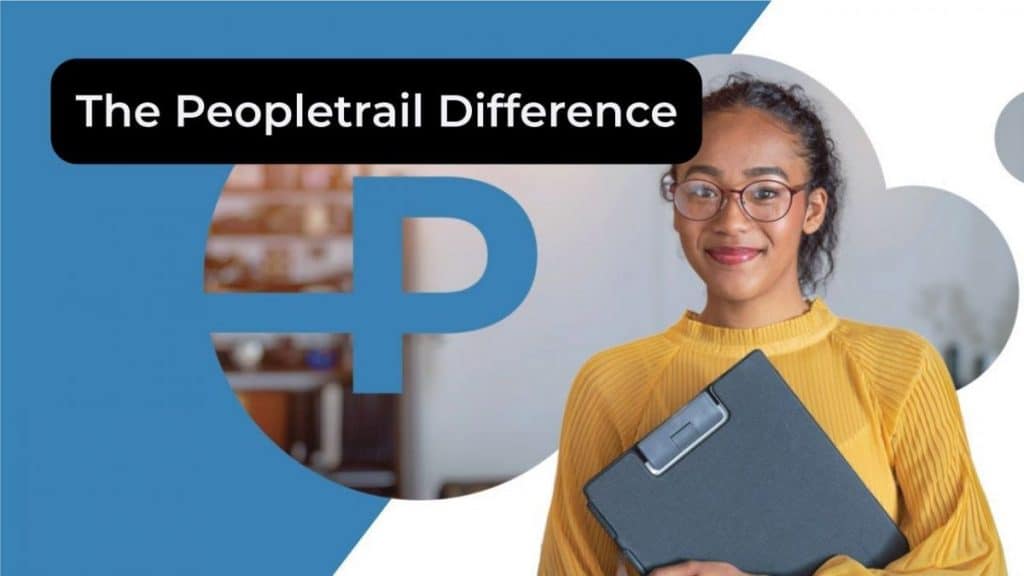
A pre-employment background screening platform, Peopletrail offers a wide range of background screening services, ensuring thorough checks for criminal records, employment history, education verification, and more.
It uses AI to provide a comprehensive analysis of a candidate’s public social media posts. It conducts FCRA and EEOC-compliant social media background screening and analyses public posts on Facebook, Instagram, Twitter, and more. Its social media screening tool looks for professional misconduct; hate speech, bullying; illegal behavior, violence, and explicit online content that could potentially reflect sexual harassment in the workplace.
Pros:
- The platform tailors its screening solutions to meet the specific needs of different industries and organizations.
- Social media checks are typically submitted within 3 business days.
Cons:
- Comprehensive background checks can take time to complete, potentially extending the hiring timeline.
9. Hume AI
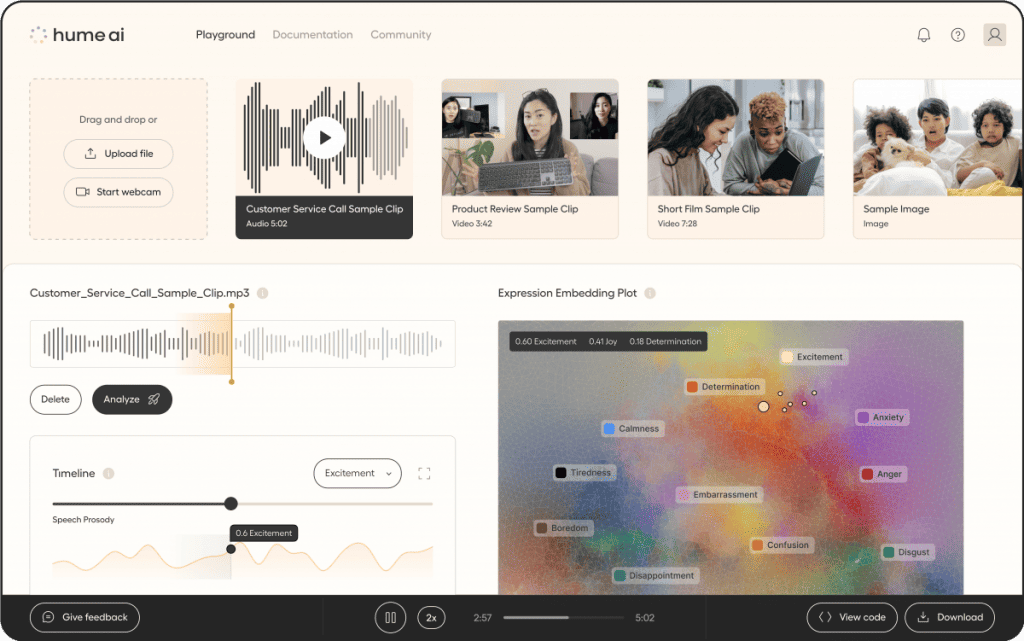
Through its extensive array of AI models, along with datasets and an API, Hume AI’s offerings can be integrated into an organization’s recruitment procedures. These datasets are meticulously trained on vast quantities of fully-consented samples from across the globe.
Among its notable models are expressive language, facial expression, dynamic reaction, and sentiment analysis. Users can simply upload videos or audio for Hume AI’s technology to analyze and interpret human expressions, providing a comprehensive assessment of emotional cues.
Pros:
- Hume AI provides an array of AI models that can help users analyze human expressions.
- Its API can be integrated into applications.
Cons:
- A steep learning curve and prior coding expertise may be required for API integration.
10. Diversio
Diversio, an AI-powered platform, enables organizations to measure, enhance, and track diversity, equity, and inclusion (DEI) initiatives. With features such as Diversity Data Collection, the platform gathers employee demographic data, aiding in tracking progress and identifying areas for targeted DEI efforts. Inclusion Surveys engage employees to share their experiences, guiding interventions for a more inclusive environment.
The AI-driven Recommendation Engine detects unconscious bias in decisions, aligning choices with DEI goals. Diversio’s Benchmarking compares DEI performance against peers and national averages, and its Reporting function summarizes progress, providing a comprehensive toolset for meaningful change toward diverse and inclusive workplaces.
Pros:
- Offers a holistic view of an organization’s diversity, equity, and inclusion efforts through data collection, surveys, and AI-driven analysis.
- The platform’s inclusion surveys empower organizations to identify and address areas of exclusion.
- Diversio’s AI-powered Recommendation Engine detects unconscious bias in workplace decisions.
Cons:
- Implementing and managing Diversio’s features effectively may require a significant allocation of time and resources.
- While AI-driven bias detection is valuable, it may not capture all nuanced forms of bias or fully replace human judgment in DEI efforts.
| AI Screening Tool | Key Features | Pricing | Pros | Cons |
|---|---|---|---|---|
| Humanly | – Chatbot software for screening and scheduling candidates – Role-specific conversational templates – Analysis of company’s engagement data – Predictive learning for candidate potential | Pricing available upon request | – Bias-free conversational interactions – Auto-summarization of interview content | – It’s a fairly new platform |
| HireVue | – AI-driven video interviews – Analysis of verbal and non-verbal cues – Remote interview capabilities | Corporate pricing: From $35,000 Enterprise: Custom | – Efficient initial candidate screening – Comprehensive candidate evaluation | – Possible algorithmic biases in non-verbal cues |
| DevSkiller TalentScore | – Skill-based technical screening – Real-world coding challenges – AI-driven code review and analysis | Basic: $499/mo Essential: $699/mo Premium: $999/mo | – Accurate assessment of technical proficiency – Automation of code review | – May not assess collaborative abilities – Focus primarily on coding skills |
| Pymetrics | – Data-driven behavioral insights – Cognitive games and assessments – Focus on soft skills and cognitive traits | Pricing available upon request | – Reduces unconscious bias in hiring – Personalized candidate experience | – Algorithm accuracy crucial for success – Focus on cognitive traits may overlook other skills |
| Pipplet | – Language proficiency assessments in over 40 languages – Global CEFR grading | Varies based on usage | – Wide range of language assessments | – Talent AI language proficiency test only in English |
| TestGorilla | – Cognitive, technical, and soft skills assessments – Peer-reviewed tests by experts – Mobile-friendly tests | Pay-as-you-go and scaled pricing | – Versatile range of assessments – Mobile-friendly testing | – Can be expensive for some organizations |
| Skillate | – Chatbot screening, resume parsing, auto interview scheduling – Job description assistant – Predictive analytics and reporting | Pricing available upon request | – Automated screening process – In-depth analysis and reporting | – Reliance on data accuracy |
| Peopletrail | – Background screening services – AI-powered social media screening | Pricing available upon request | – Customized screening solutions – AI-powered social media analysis | – Background checks may extend hiring timeline |
| Hume AI | – AI models for emotional analysis – Expressive language, facial expression, dynamic reaction, sentiment analysis | API integration pricing varies | – Analysis of human expressions – API integration capabilities | – Learning curve for API integration |
| Diversio | – Diversity data collection – Inclusion surveys – AI-driven Recommendation Engine – Benchmarking and reporting | Pricing available upon request | – Holistic view of DEI efforts – Bias detection and inclusion interventions | – Resource-intensive implementation – AI may not capture all nuanced bias forms |
FAQs
What are AI screening tools, and how do they work?
AI screening tools are advanced software applications that utilize artificial intelligence and machine learning to assess and evaluate candidates during the recruitment process. They help streamline hiring by automating various aspects, such as resume analysis, skill assessments, and even analyzing candidates’ behavioral cues in video interviews. These tools leverage AI algorithms to match candidates’ qualifications with job requirements, enhancing the efficiency and accuracy of the hiring process.
Who can benefit from using AI screening tools?
AI screening tools are beneficial for a wide range of organizations, from small businesses to large enterprises. They are particularly useful for HR departments, recruiters, and hiring managers who aim to optimize their candidate evaluation processes. These tools cater to industries spanning technology, finance, healthcare, and more, making them versatile solutions for any organization seeking to improve their talent acquisition strategies.
What types of AI screening tools are available?
AI screening tools come in various types to address different recruitment needs. Some common types include:
- Resume Screening AI: Analyzes resumes and matches candidate skills with job requirements.
- Video Interview Analysis: Assesses candidates’ verbal and non-verbal cues during video interviews.
- Skill Assessment Platforms: Administers and evaluates technical tests in areas like coding or data analysis.
- Personality and Behavioral Analysis: Assesses candidates’ personality traits based on their digital footprint.
- Cognitive Ability Tests: Measures problem-solving and critical thinking skills.
- Predictive Analytics Tools: Analyzes historical data to predict candidates’ potential performance and longevity.
- Diversity and Inclusion Assessment: Promotes inclusive hiring practices by analyzing candidates’ backgrounds.
How accurate are AI screening tools in candidate evaluation?
AI screening tools can offer highly accurate candidate evaluations when properly calibrated and maintained. However, their accuracy depends on factors such as the quality and diversity of the training data used to develop the algorithms. Bias detection and mitigation techniques are also crucial to ensure fairness and prevent algorithmic biases. Regular updates and monitoring are essential to maintain accuracy and align AI screening tools with an organization’s evolving needs.
Can AI screening tools replace human judgment in hiring?
While AI screening tools offer valuable efficiency and objectivity, they are not designed to replace human judgment entirely. Human involvement remains crucial for interpreting nuanced qualities, assessing cultural fit, and making final hiring decisions. AI screening tools should be seen as tools that assist and augment human decision-making, helping organizations make more informed and data-driven choices while ultimately respecting the unique qualities candidates bring to the table.
Conclusion
AI screening tools help organizations to streamline their candidate selection processes while minimizing human bias and subjectivity. From analyzing resumes to evaluating personality traits, these tools provide a holistic view of applicants, enabling recruiters to speed up the hiring process for their clients.
Read more about AI:
[ad_2]
Read More: mpost.io

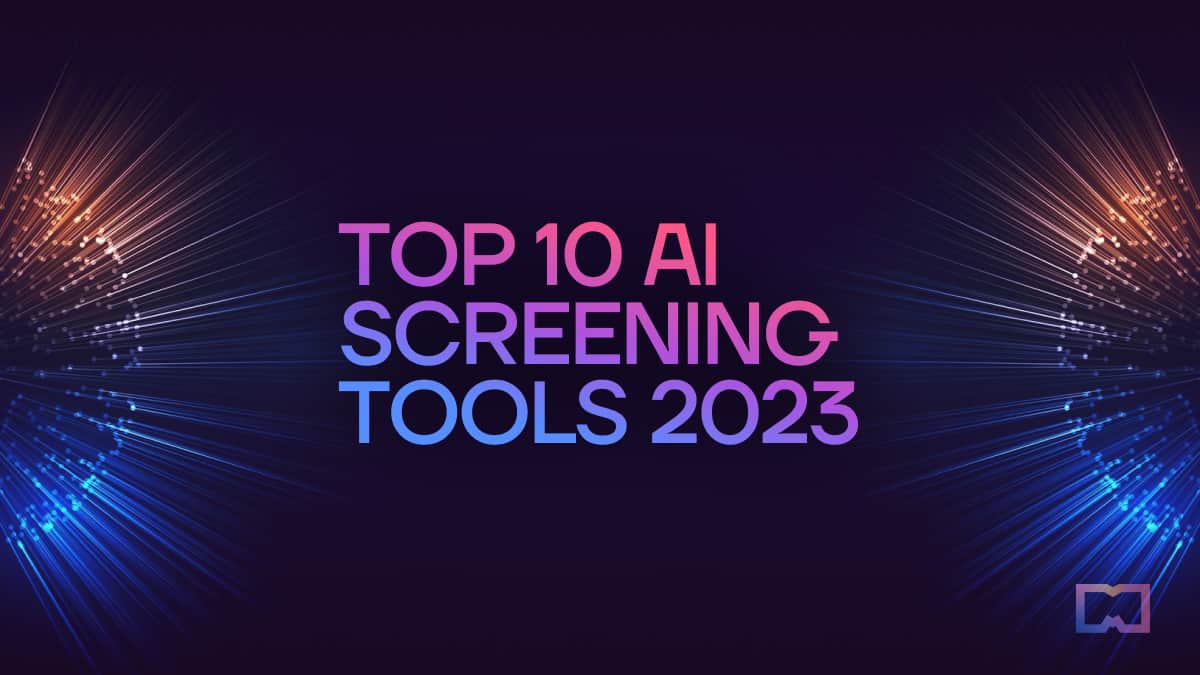







 Bitcoin
Bitcoin  Ethereum
Ethereum  Tether
Tether  XRP
XRP  Solana
Solana  USDC
USDC  TRON
TRON  Dogecoin
Dogecoin  Lido Staked Ether
Lido Staked Ether  Cardano
Cardano  Wrapped Bitcoin
Wrapped Bitcoin  Hyperliquid
Hyperliquid  Wrapped stETH
Wrapped stETH  Sui
Sui  Bitcoin Cash
Bitcoin Cash  Chainlink
Chainlink  LEO Token
LEO Token  Stellar
Stellar  Avalanche
Avalanche  Toncoin
Toncoin  WhiteBIT Coin
WhiteBIT Coin  USDS
USDS  Shiba Inu
Shiba Inu  WETH
WETH  Wrapped eETH
Wrapped eETH  Litecoin
Litecoin  Binance Bridged USDT (BNB Smart Chain)
Binance Bridged USDT (BNB Smart Chain)  Hedera
Hedera  Monero
Monero  Ethena USDe
Ethena USDe  Polkadot
Polkadot  Bitget Token
Bitget Token  Coinbase Wrapped BTC
Coinbase Wrapped BTC  Uniswap
Uniswap  Pepe
Pepe  Pi Network
Pi Network  Aave
Aave  Dai
Dai  Ethena Staked USDe
Ethena Staked USDe  Bittensor
Bittensor  OKB
OKB  BlackRock USD Institutional Digital Liquidity Fund
BlackRock USD Institutional Digital Liquidity Fund  Aptos
Aptos  Cronos
Cronos  Internet Computer
Internet Computer  NEAR Protocol
NEAR Protocol  Jito Staked SOL
Jito Staked SOL  sUSDS
sUSDS  Ethereum Classic
Ethereum Classic